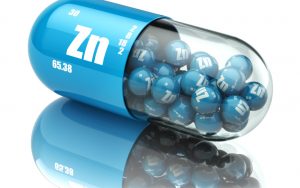- Home
- Editorial
- News
- Practice Guidelines
- Anesthesiology Guidelines
- Cancer Guidelines
- Cardiac Sciences Guidelines
- Critical Care Guidelines
- Dentistry Guidelines
- Dermatology Guidelines
- Diabetes and Endo Guidelines
- Diagnostics Guidelines
- ENT Guidelines
- Featured Practice Guidelines
- Gastroenterology Guidelines
- Geriatrics Guidelines
- Medicine Guidelines
- Nephrology Guidelines
- Neurosciences Guidelines
- Obs and Gynae Guidelines
- Ophthalmology Guidelines
- Orthopaedics Guidelines
- Paediatrics Guidelines
- Psychiatry Guidelines
- Pulmonology Guidelines
- Radiology Guidelines
- Surgery Guidelines
- Urology Guidelines
Zinc - The element of life

The importance of zinc was 1st reported for Aspergillus niger. It took over 75 years to realize that zinc is also an essential trace element for rats, and an additional 30 years went by before it was recognized that this was also true for humans. It is pertinent to state that zinc is one of the most important essential trace metals in human nutrition and lifestyle. It is relevant to state that zinc is one of the most important essential trace metals in human nutrition and lifestyle. Its deficiency may severely affect the homeostasis of a biological system.
Researchers identified zinc as one of the most important essential trace metals in human nutrition and lifestyle in a new review article in Comprehensive Reviews in Food Science and Food Safety, published by the Institute of Food Technologists (IFT). Zinc is not only a vital element in various physiological processes; it is also a drug in the prevention of many diseases.
The adult body contains about two to three grams of zinc. It is found in organs, tissues, bones, fluids, and cells. Foods with high protein content, specifically animal protein, are major sources of zinc in the human diet. Zinc can also be used as fortification for other foods as well. Nearly half of the world’s population is at risk for inadequate zinc intake. The article reviewed numerous studies that showed a relationship between zinc and vital human physiological processes such as the following:
- Brain: The blood zinc level is less in patients with Alzheimer’s and Parkinson’s disease (Brewer, and others 2010).In a rodent study, it was observed that zinc behaves like an antidepressant (Nowak and others, 2005).
- Cardiovascular System: Zinc performs a noteworthy role in the regulation of arterial blood pressure. Males and females were reported to metabolize zinc differently when suffering from hypertension (Tubek, 2007).
- Liver: Zinc deficiency in the liver occurs not only in those with liver cirrhosis but also in less advanced alcoholic and nonalcoholic liver disease (Bode and others, 1998).
- Pregnancy: A mild deficiency of zinc during a pregnancy can cause increased maternal morbidity, abnormal taste sensation, prolonged gestation, inefficient labor, atonic bleeding, and an increased risk to fetuses (Jameson, 1993).
- Diabetes: Zinc is very important in the synthesis, storage, and secretion of insulin (Chausmer 1998). A low level of zinc has been shown to play a role in diabetics with associated disease conditions such as coronary artery disease and several related risk factors including hypertension, and elevated levels of triglycerides (Singh and others, 1998).
- Endocrine System: Studies show a correlation between zinc deficiency in geriatric patients and reduced activity of the thymus gland and thymic hormones, decreased response to vaccinations, and reduced immunity (Haase and Rink, 2009).
- Healing: Zinc deficiency has been linked with delayed wound healing, and has been found to be crucial to the healing of gastric ulcers especially at the early stage (Kennan and Morris, 1993; Andrews and Gallagher-Allred, 1999; Watanabe, 1995).
Pneumonia: Zinc may shorten the duration of severe pneumonia and time in the hospital (Brooks, 2004).
For further reference log on to :

Disclaimer: This site is primarily intended for healthcare professionals. Any content/information on this website does not replace the advice of medical and/or health professionals and should not be construed as medical/diagnostic advice/endorsement or prescription. Use of this site is subject to our terms of use, privacy policy, advertisement policy. © 2020 Minerva Medical Treatment Pvt Ltd